-

人教版高中政治必修4第五课把握思维的奥妙精品教案
【导入新课】2005年10月17日凌晨,5天前从酒泉卫星发射中心起航的“神舟”六号飞船,在平安飞行115个小时32分后重返神州,缓缓降落在内蒙古四子王旗主着陆场的草地上。我国首次真正意义上有人参与的空间飞行试验取得圆满成功。 当费俊龙和聂海胜先后自主出舱,面带胜利的微笑,现场参试人员欢呼雀跃,亿万中华儿女为之自豪,幸福写在每个人的脸上。神六飞行是一次非常完美的飞行任务,又一次让载人航天精神“从地面升到天空,从天空安全返回”。伟大的事业孕育伟大的精神。新一代航天人在攀登科技高峰的伟大征程中,以特有的崇高境界、顽强意志和杰出智慧,铸就了载人航天精神,这就是特别能吃苦、特别能战斗、特别能攻关、特别能奉献的精神。【思考讨论】“伟大的事业孕育伟大的精神”体现怎样的哲学道理?我国为什么要提倡发扬“特别能吃苦、特别能战斗、特别能攻关、特别能奉献”的载人航天精神?(人具有主观能动性)
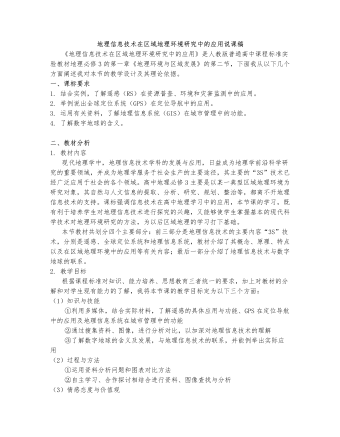
人教版高中地理必修3地理信息技术在区域地理环境研究中的应用说课稿
通过列表对比法、归纳法、、多媒体辅助法等教学方法,突破理论性强、不宜理解的“3S”原理与区别的知识难点。学生更是学会运用图表方法、高效记忆法、合作学习法等方法学习地理知识,增加学习能力。[幻灯片] “3S技术”的应用:地理信息技术的应用十分广泛,从实际身旁的社会生产生活,到地理学的区域地理环境研究。学生的年龄和认知范围决定,此部分的案例教学的运用,前者容易接触到、简单直观、易区分掌握“3S”技术特点和具体应用。而后者涉及地理学科的综合性和区域性的特点,难度较大。针对学情特点,我多以前者案例入手学习,以后者案例加以补充。案例:遥感:(1)视频 专家解说卫星遥感受灾影象(2)教材 图1.6 1998年8月28日洞庭湖及荆江地区卫星遥感图像(3)视频 2008年5月13日“北京一号”卫星提供汶川的灾区遥感图像(4)教材 阅读 遥感在农业方面的应用
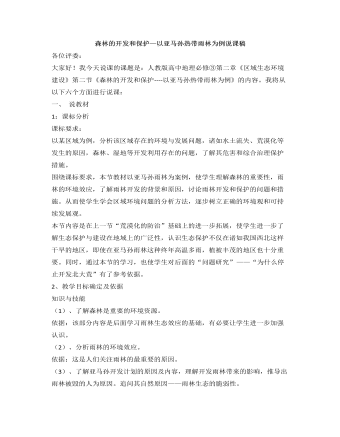
人教版高中地理必修3森林的开发和保护—以亚马孙热带雨林为例说课稿
【这部分的设计目的,要学生明白热带雨林只是一个案例,我们的目的是要合理开发和保护全世界的森林。由森林的开发与保护来明确区域发展过程中产生的环境问题,危害及治理保护措施。】然后知识迁移——东北林区的开发与保护介绍东北地区的森林材料:东北林区是我国最大的天然林区,主要分布于大、小兴安岭及长白山地,在平衡大气成分、净化空气、补给土壤有机质、涵养水源、保持水土、改善地方气候有重要的作用。它还是我国最大的采伐基地,宜林地区广,森林树种丰富。 东北林区开发中的问题及影响点拨:由于人类的严重超采,采育脱节,乱砍滥伐,毁林开荒,再加上森林火灾,东北林区的面积在锐减,带来了严重的生态恶化。我们该如何开发和保护东北地区的森林呢?
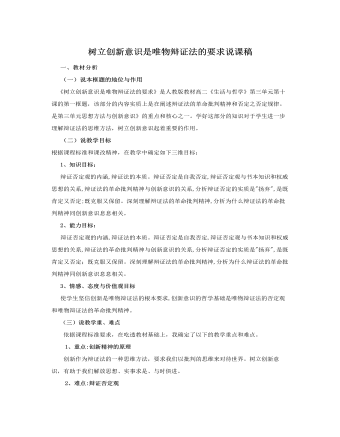
人教版高中政治必修4树立创新意识是唯物辩证法的要求说课稿(二)
一、教材分析(一)说本框题的地位与作用《树立创新意识是唯物辩证法的要求》是人教版教材高二《生活与哲学》第三单元第十课的第一框题,该部分的内容实质上是在阐述辩证法的革命批判精神和否定之否定规律。是第三单元思想方法与创新意识》的重点和核心之一。学好这部分的知识对于学生进一步理解辩证法的思维方法,树立创新意识起着重要的作用。(二)说教学目标根据课程标准和课改精神,在教学中确定如下三维目标:1、知识目标:辩证否定观的内涵,辩证法的本质。辩证否定是自我否定,辩证否定观与书本知识和权威思想的关系,辩证法的革命批判精神与创新意识的关系,分析辩证否定的实质是"扬弃",是既肯定又否定;既克服又保留。深刻理解辩证法的革命批判精神,分析为什么辩证法的革命批判精神同创新意识息息相关。
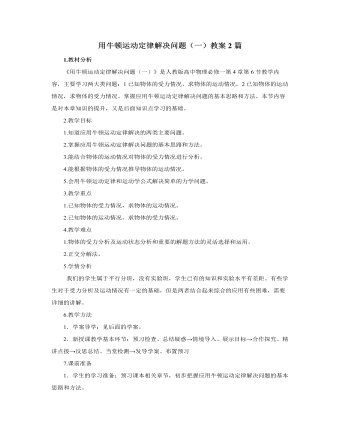
人教版新课标高中物理必修1用牛顿运动定律解决问题(一)教案2篇
(四)实例探究☆力和运动的关系1、一个物体放在光滑水平面上,初速为零,先对物体施加一向东的恒力F,历时1秒,随即把此力改变为向西,大小不变,历时1秒钟,接着又把此力改为向东,大小不变,历时1秒钟,如此反复只改变力的方向,共历时1分钟,在此1分钟内A.物体时而向东运动,时而向西运动,在1分钟末静止于初始位置之东B.物体时而向东运动,时而向西运动,在1分钟末静止于初始位置C.物体时而向东运动,时而向西运动,在1分钟末继续向东运动D.物体一直向东运动,从不向西运动,在1分钟末静止于初始位置之东☆牛顿运动定律的应用2、用30N的水平外力F,拉一静止放在光滑的水平面上质量为20kg的物体,力F作用3秒后消失,则第5秒末物体的速度和加速度分别是A.v=7.5m/s,a=l.5m/s2B.v=4.5m/s,a=l.5m/s2C.v=4.5m/s,a=0D.v=7.5m/s,a=0
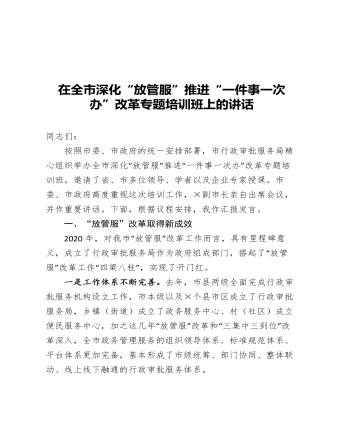
在全市深化放管服推进一件事一次办改革专题培训班上的讲话
一是工作体系不断完善。去年,市县两级全面完成行政审批服务机构设立工作,市本级以及×个县市区成立了行政审批服务局,乡镇(街道)成立了政务服务中心、村(社区)成立便民服务中心,加之这几年“放管服”改革和“三集中三到位”改革深入,全市政务管理服务的组织领导体系、标准规范体系、平台体系更加完备,基本形成了市级统筹、部门协同、整体联动、线上线下融通的行政审批服务体系。

新人教版高中英语必修1Unit 1 Teenage Life-Listening and Speaking & Listening and Talking教案
Step 2 Listening and Talking1. The teacher is advised to talk with their new students about the related topic: Boys and girls, do you know some structures to talk about future activities? Talking about future activitiesWe’ll …I plan to …There’ll be …I hope to …We’re going to …2. After their small talk, the teacher can move on by playing the listening and solve the following task.Underline the expressions in the sentences below Cao Jing and Max use to talk about the future.We’ll learn useful skills.I plan to improve my spoken English.There’ll be students from different schools.I hope to make new friends.We’ll talk about teenage life.I’ll learn to make a fire.There’ll be students from different countries at the camp.There’ll be some experts there to show us how to live in the wild.We’re going to learn about wildlife.I’m going to give a speech.I think I’m going to enjoy the activities.I think we’ll have a lot of fun.3. Work in groups. Plan a youth camp.Teacher make the Ss think of ideas for the camp. And they can use the questions below to get started. And have the Ss present their ideas for a youth camp to the class.●What kind of camp is it?●Who will be there?●What will they do?●What will they learn?
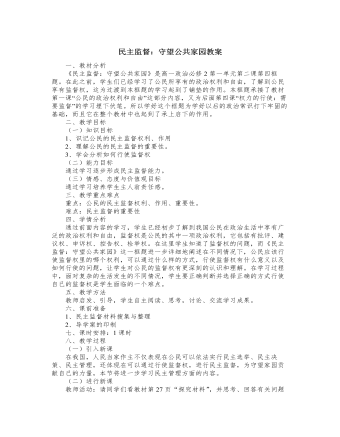
人教版高中政治必修2民主监督:守望公共家园教案
一、教材分析《民主监督:守望公共家园》是高一政治必修2第一单元第二课第四框题。在此之前,学生们已经学习了公民所享有的政治权利和自由,了解到公民享有监督权,这为过渡到本框题的学习起到了铺垫的作用。本框题承接了教材第一课“公民的政治权利和自由”这部分内容,又为后面第四课“权力的行使:需要监督”的学习埋下伏笔。所以学好这个框题为学好以后的政治常识打下牢固的基础,而且它在整个教材中也起到了承上启下的作用。二、教学目标(一)知识目标1、识记公民的民主监督权利、作用2、理解公民的民主监督的重要性。3、学会分析如何行使监督权(二)能力目标通过学习逐步形成民主监督能力。(三)情感、态度与价值观目标通过学习培养学生主人翁责任感。三、教学重点难点重点:公民的民主监督权利、作用、重要性。难点:民主监督的重要性
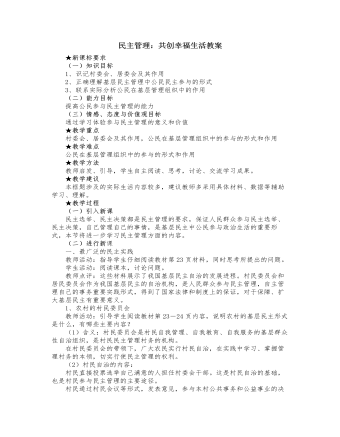
人教版高中政治必修2民主管理:共创幸福生活教案
教师活动:请同学们阅读教材P26页图表,思考所提的问题。学生活动:阅读课本,积极思考。教师点评:公民应在本地事务中增强主人翁责任感,积极参与民主管理。在参与民主管理的过程中,学习民主管理的知识和技能,体验民主管理的意义和价值,逐步增强和提高自己政治参与的责任意识和实际本领。2、青年学生应积极参与民主管理青年学生应着眼于未来发展,积极参与民主管理。在基层民主自治这种最广泛的民主实践中,获得更多民主管理机会,以不同方式尝试参与参与民主管理活动。在参与民主管理的过程中,学习民主管理的知识和技能,体验民主管理的意义和价值,逐步增强和提高自己政治参与的责任意识和实际本领。(三)课堂总结、点评本节内容讲述了我国的基层民主管理形式和主要内容,明确了积极参与基层民主管理的重要意义,这对我们提高自身政治素质,增强参与政治生活的责任感和能力等,有重大作用。
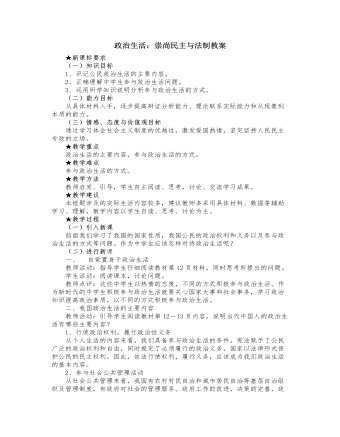
人教版高中政治必修2政治生活:崇尚民主与法制教案
2、学习有关政治知识学习政治知识有助于提高辨别是非能力,坚持正确政治方向;有助于紧扣时代脉搏,开阔眼界;有助于树立国家观念,维护国家利益;有助于增强民主法制观念培养公民意识;有助于提高参与政治生活的能力。3、参与政治生活,贵在实践教师活动:同学们参加过什么政治活动?你还知道有哪些可以参与的政治活动?学生活动:积极思考。我国公民参与政治生活的方式多种多样,无论什么方式,重要的是参与,在实践中才能才能不断提高自己的政治素质和参与政治生活的能力。(三)课堂总结、点评本节内容讲述了我国的政治生活的主要内容和中学生参与政治生活的方式、途径,这对我们今后提高自身政治素质,增强参与政治生活的能力等,证明了奋斗方向。
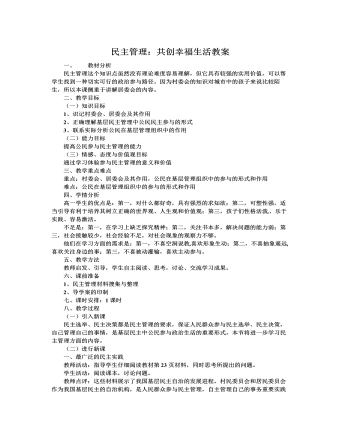
人教版高中政治必修2民主管理:共创幸福生活教案
一、 教材分析民主管理这个知识点虽然没有理论难度容易理解,但它具有较强的实用价值,可以帮学生找到一种切实可行的政治参与路径。因为村委会的知识对城市中的孩子来说比较陌生,所以本课侧重于讲解居委会的内容。二、教学目标(一)知识目标1、识记村委会、居委会及其作用2、正确理解基层民主管理中公民民主参与的形式3、联系实际分析公民在基层管理组织中的作用(二)能力目标提高公民参与民主管理的能力(三)情感、态度与价值观目标通过学习体验参与民主管理的意义和价值三、教学重点难点重点:村委会、居委会及其作用,公民在基层管理组织中的参与的形式和作用难点:公民在基层管理组织中的参与的形式和作用四、学情分析高一学生的优点是:第一,对什么都好奇,具有强烈的求知欲;第二,可塑性强,适当引导有利于培养其树立正确的世界观、人生观和价值观;第三,孩子们性格活泼,、乐于实践、容易激活。

新人教版高中英语必修1Unit 3 Sports and Fitness- Discovering Useful Structures—tag questions教案
【教材分析】This teaching period mainly deals with the grammar: tag questions.This period carries a considerable significance to the cultivation of students’ spoken English. The teacher is expected to enable students to master this period thoroughly and consolidate the knowledge by doing some exercise of good quality.【教学目标与核心素养】1. Get students to have a good understanding of the basic usages of tag questions.2. Enable students to use the basic phrases structures flexibly.3. Develop students’ speaking and cooperating abilities.4. Strengthen students’ great interest in grammar learning.【教学重难点】1. How to enable students to have a good understanding of the basic usages of tag questions.2. How to enable students to use the basic usages of tag questions flexibly.【教学过程】Step1: 语法自主探究一、基本组成方法1.肯定式陈述部分+否定附加疑问部分(前肯后否) You often play badminton, don’t you? 你经常打羽毛球,是吗?You are going to the gym with me, aren’t you?你要和我一起去健身房,是吗?She’s been to shanghai before, hasn’t she? 她以前去过上海,是吗?2.否定式陈述部分+肯定附加疑问部分(前否后肯) It isn't a beautiful flower, is it? 那不是美丽的花,是吗?You didn't go skating yesterday, did you? 你昨天没去滑冰,是吗?They can’t finish it by Friday, can they?他们不能在星期五之前完成,是吗?

新人教版高中英语必修3Unit 1 Festivals and celebrations-Discovering Useful Structure教学设计
4.That was an experience that frightened everyone. →That was _____________________. 答案:1. taking 2. being discussed 3. in the reading room 4. a frightening experienceStep 6 The meaning and function of V-ing as the predicative动词-ing形式作表语,它通常位于系动词后面,用以说明主语“是什么”或“怎么样”一种表示主语的特质、特征和状态, 其作用相当于形容词; 另一种具体说明主语的内容, 即主语等同于表语, 两者可互换。The music they are playing sounds so exciting. 他们演奏的音乐听起来令人激动。The result is disappointing. 结果令人失望。Our job is playing all kinds of music. 我们的工作就是演奏各种音乐。Seeing is believing. 眼见为实。Step 7 Practice1. It is ________(amaze) that the boy is able to solve the problem so quickly.2. Buying a car is simply _______(waste) money. 3. Please stop making the noise—it’s getting ________(annoy). 4. complete the passage with the appropriate -ing form.La Tomatina is a festival that takes place in the Spanish town Bunol every August. I think many food festivals are __________ because people are just eating. however, this festival is _________ because people don't actually eat the tomatoes. Instead, they throw them at each other! the number of people ________ part in this tomato fight, can reach up to 20,000, and it is a very __________ fight that lasts for a whole hour. The _______ thing is how clean Bunol is after the tomatoes are washed away after the fight. this is because the juice form tomatoes is really good for making surfaces clean!答案:1. amazing 2. wasting 3. annoying4. boring interesting taking exciting amazing

新人教版高中英语必修3Unit 1 Festivals and Celebrations-Reading and Thinking教学设计
The topic of this part is “Discover the reasons for festivals and celebrations.The Listening & Speaking & Talking part aims at talking about the experiences and feelings or emotions about the festivals and celebrations. This section aims at detecting the reason why the people celebrate the festivals, the time, the places, the types and the way of celebrations. It also explains why some traditions in the old celebrations are disappearing, like the firecrackers in the big cities and some new things are appearing like the prosperity of business or commerce. 1. Students can talk about what festivals they know and the reasons and the way of celebrating them.2. Students should learn the reading skills such as the headline and get the topic sentences, the structures of articles.3. Students can understand the past, the present situation of some festival around the world and why there are some changes about them. 4. Students can have the international awareness about the festivals.1. Students should learn the reading skills such as the headline and get the topic sentences, the structures of articles.2. Students can understand the past, the present situation of some festival around the world and why there are some changes about them.Step 1 Lead in---Small talkWhat festival do you like best ? Why ?I like the Spring Festivals because I can set off the fireworks, receive the lucky money and enjoy the Gala with my families.Step 2 Before reading---Pair workWhy do people celebrate different festivals ?The Spring Festivals is to celebrate the end of winter and the coming of spring and new life.The Mid-autumn Day is to celebrate the harvest and admire the moon.

新人教版高中英语必修3Unit 1 Festivals and Celebrations-Listening &Speaking&Talking教学设计
The theme of this section is “Talk about festival activities and festival experiences”.Festival and holiday is a relaxing and interesting topic for students. This part talks about the topic from the daily life of students’. In the part A ---Listening and Speaking, there are three conversations among different speakers from three countries(Japan, Rio and China), where the speakers are participating in or going to participate in the festivals and celebrations. So listening for the relationship among them is a fundamental task. Actually, with the globalization and more international communication, it is normal for Chinese or foreigners to witness different festivals and celebrations in or out of China. In the Conversation 1, a foreign reporter is interviewing a Japanese young girl who just had participated in the ceremony of the Coming-of-Age Day on the street and asking her feeling about the ceremony and the afterwards activities. Conversation 2, Chinese girl Li Mei is witnessing the Rio Carnival for the first time, and her friend Carla gives her some advice on the costumes which enables her to match with the carnival to have a good time. Conversation 3, a Chinese guide is showing a group of foreign visitors around the Lantern Festival and introducing the customs of the festival to them. The three conversations have a strong vitality and insert the festival and cultural elements from different countries. So perceiving the festivals and cultures from different countries is the second task. At the same time, the scripts also insert the targeted grammar --- v-ing as attributive and predicative, which students can perceive and experience in a real context and make a road for the further study. That is the third task. In the Part B--- Listening and Talking, the theme is “Talk about festival experience”, which is the common topic in our daily conversations. During the conversation, Song Lin, a Chinese student, asked Canadian friend Max about how to spend Christmas. In the conversation, Song Lin talked about experience and the feelings during the Chinese Spring Festival, during which there are not only some enjoyable things but some unpleasant things. After the listening, perhaps students find there are some similarities between Christmas and the Chinese Spring Festival as there are some differences in the origins and celebrations. For example, people always visit friends and relatives, decorate their houses, have a big dinner together, chat and give presents to each other.

新人教版高中英语必修3Unit 1 Festivals and Celebrations-Reading for writing教学设计二
Step 3 Analyzing article structureActivity 31. Teachers raise questions to guide students to analyze the chapter structure of this diary and think about how to describe the festival experience. (1)What should be included in the opening/body/closing paragraph(s)?(2)How did the writer arrange his/her ideas?(3)What kind of interesting details did the writer describe?(4)How did the writer describe his/her feelings/emotions during the event?2. Students read and compare the three sentence patterns in activity 2. Try to rewrite the first paragraph of the diary with these three sentence patterns. After that, students exchange corrections with their partners. Such as:●This was my first time spending three days experiencing the Naadam Festival in China’s Inner Mongolia Autonomous Region and it was an enjoyable and exciting experience. ●I'll never forget my experience at the Naadam Festival because it was my first time to watch the exciting Mongolian games of horse racing, wrestling, and archery so closely. ●I'll always remember my first experience at the Naadam Festival in China’s Inner Mongolia Autonomous Region because it was so amazing to spend three days witnessing a grand Mongolian ceremony. Step 4 Accumulation of statementsActivity 41. Ask the students to read the diary again. Look for sentences that express feelings and emotions, especially those with the -ing form and the past participle. Such as:● …horse racing, wrestling, and archery, which are all so exciting to watch. ● some amazing performances● I was surprised to see…● I was a little worried about. . . ● feeling really tiredOther emotional statements:●I absolutely enjoyed the archery, too, but the horse races were my favourite part. ●I'm finally back home now, feeling really tired, but celebrating Naadam with my friend was totally worth it. ●He invited me back for the winter to stay in a traditional Mongolian tent and cat hot pot. I can’t wait!2. In addition to the use of the -ing form and the past participle, the teacher should guide the students in the appreciation of these statements, ask them to memorize them, and encourage them to use them reasonably in writing practice.

新人教版高中英语必修1Unit 3 Sports and Fitness-Listening and Speaking & Listening and Talking教案
Finally, after finishing the task above, the teacher is expected to instruct students to work in groups to finish the following project:Speaking ProjectWhat event or activity would you like to invite your friend to? Make a conversation with a partner.Ski Race: Zhangjiakou, a beautiful city in northern China, will host the Youth Ski Race in December.Track Meet: a great event for track –and –field lovers on 26 October.Gym Class: come and work out at a gym! You can make it.Part 2: Listening and Talking:The teacher is advised to talk with their new students about the related topic: Boys and girls , what do you think of sportsmanship? Let’s listen and find out:Play the listening and match each opinion with the right speaker. Who do you agree with? Why?Cao Jing _____________ Lily _____________ Max _____________A. An athlete should do his/her best to win.B. The girl should stop and help the other girl. Good sportsmanship is more important than wining!C. An athlete should think about honor and his/her fans if he/she is competing for his/her country.Listen again and circle the expressions that you hear in the conversation.
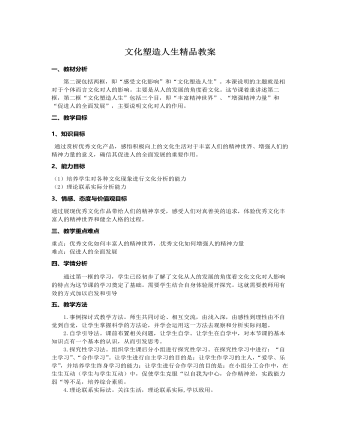
人教版高中政治必修3文化塑造人生精品教案
A.人创造了文化,文化创B.人创造了文化,文化也塑造着人,不断丰富着人的精神世界C.文化具有潜移默化的作用D.世界观、人生观、价值观是人们文化素养的核心和标志2、在我国全面建设小康社会的过程中,我们要把民族精神教育纳入国民教育全过程,纳入精神文明建设全过程,使全体人民始终保持昂扬向上的精神状态。这是由于()A.文化能够丰富人的精神世界B.文化能够增强人的精神力量C.文化能够促进人的全面发展D.人的思想意识对事物发展起决定作用3、我国已进入全面建设小康社会,加快推进社会主义现代化的新的发展阶段,人们的温饱问题基本解决,健康有了基本保障。随着物质生活需要逐步得到满足,人们更加注重精神生活需要的满足,对文化活动表现出日渐浓厚的兴趣,文化消费在生活消费中的比重越来越大。这段话主要说明的是,新时期:
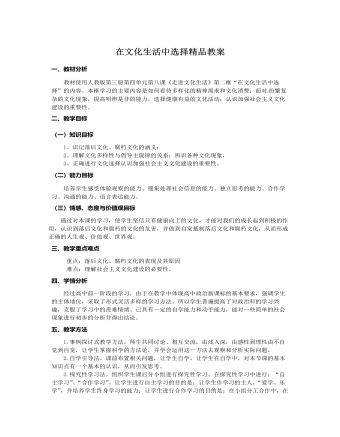
人教版高中政治必修3在文化生活中选择精品教案
一、教材分析教材使用人教版第三册第四单元第八课《走进文化生活》第二框“在文化生活中选择”的内容。本框学习的主要内容是如何看待多样化的精神需求和文化消费;面对 纷繁复杂的文化现象,提高明辨是非的能力,选择健康有益的文化活动;认识加强社会主义文化建设的重要性。二、教学目标(一)知识目标1、识记落后文化、腐朽文化的涵义;2、理解文化多样性与倡导主旋律的关系;辨识各种文化现象,3、正确进行文化选择认识加强社会主义文化建设的重要性。(二)能力目标培养学生感受体验观察的能力、搜集处理社会信息的能力、独立思考的能力、合作学习、沟通的能力、语言表达能力。(三)情感、态度与价值观目标通过对本课的学习,使学生坚信只有健康向上的文化,才能对我们的成长起到积极的作用,认识到落后文化和腐朽的文化的危害,并做到自觉抵制落后文化和腐朽文化,从而形成正确的人生观、价值观、世界观。
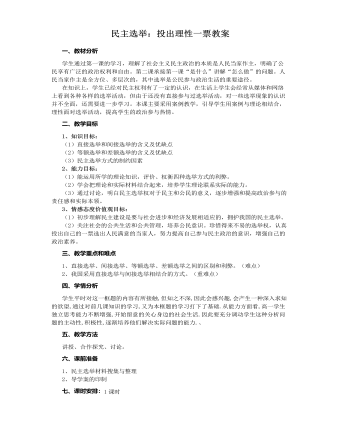
人教版高中政治必修2民主选举:投出理性一票教案
1、第一,材料一和材料二的选举方式有什么异同?(1)相同点:①都采用了演讲和答辩等形式,都带有竞选的性质;②都采用无记名、直接选举的方式进行投票选举;③都属于差额选举。(2)不同点:①材料一是对村主任进行的正式选举,结果是直接产生村主任,材料二是对镇长候选人进行的选举,结果只是确定镇长候选人,镇长人选还有待进行正式选举;②材料一是全体村民都参加选举,材料二是各户派代表参加选举;③材料二比材料一更强调竞选的方式。第二,你还知道哪些选举方式?除了直接选举外,还有间接选举、等额选举、差额选举等。第三,你能对这几种选举方式的意义和效果,作出自己的评估吗?这是学习中要探究的问题,这里不一定能回答出来,等到学完本框内容后,可以得出比较明确的答案。第四,材料三给了你什么启示?这个问题不要求统一的答案,能讲出一两点即可。提示如下:(1)新中国成立后,选举制度经历半个多世纪的发展,正在逐步走向完善;